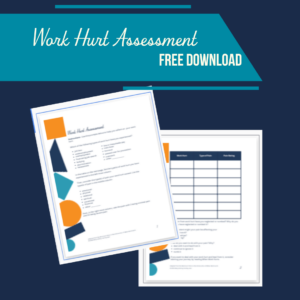
Follow Me on Substack
Most of my blog-style posts are now on Substack. Check it out, and subscribe to have the posts delivered directly to your inbox. When you subscribe, you'll get a free Work Hurt Assessment.

Intention #4: Break Down the Walls When it comes to building walls, I am a master. But don’t hand me a nail gun and a two-by-four. That’s not my sort of wall. No, I am an expert at building invisible walls. About a decade ago, I built a rebar-reinforced concrete wall between a Children’s Pastor and myself. I had been tasked with aligning the Vacation Bible School curriculum our church had purchased with the church’s philosophy of ministry and theology. In my recent-seminary-grad-zeal, I may have gone a bit overboard in my changes and found myself drowning in the amount of work and responsibility I had assumed. The night before VBS started, I discovered a tremendous amount of work had gone undone because I had assumed a certain team had responsibility for it. I had no idea that another team existed for that task. I was furious that I didn’t know what I didn’t know. I blamed the Children’s Pastor for poor leadership and lack of communication. And out of my frustration, I built a wall between the two of us. I didn’t want to work with her ever again. I wasn’t eager to learn about my missteps in handling the […]
Intention #3: Write Often Discipline. I’m not a fan. And yet discipline is a crucial aspect of my third intention: write often. I doubt anyone would describe me as a disciplined person. For the twelve years I studied piano, I never practiced on a consistent schedule. Scales? Pass. Instead, I crammed the few days before a recital or competition with hours of ruthless practice. I’ve never really had a “daily quiet time.” During my freshman year of college, my routine looked like this: leave Spanish class, buy a Coke and a muffin, head back to my dorm room, listen to an Elizabeth Elliot message, read the Bible for seven minutes, journaled for seven minutes, and pray for seven minutes. But when my schedule changed, so did my quiet time rhythms. Discipline Brings Freedom Older and wiser, I now know that discipline can bring freedom. The jazz pianist who practiced the scales, the cadences, and the rhythms can improvise with ease. The person who read the Bible and prayed consistently knows God deeper and reflects his character effortlessly. Discipline begins at a young age. Our parents and caretakers discipline us to train our character. Our teachers discipline us to train our […]
Intention #2: Inquire of the LORD Recently I discovered a new type of prayer: The check-in prayer. Typically I default to one of three prayers: The Gratitude Prayer Dear God, thank you for the joy that my planter of tiny succulents brings me. Amen. The Wisdom Prayer Dear God, I don’t know how to encourage my friend as she walks through this crisis. Help me, please. The Intercessory Prayer Dear God, my friend has a book proposal due in a few months. You have called her to be a wife, a mom, a program director, and a writer. Help her find the time to write. Amen. I pray in these ways because I believe God gives. He gives beauty and words and time. He gives life and breath and food and shelter. He gives courage and direction. He gives help and healing and wholeness. What else do I believe about God? And how do my beliefs shape how I pray? Prayer is tricky. We’re never quite sure how to do it. We’re not quite sure how it works. Still, we know we ought to talk with God. So we pray. I noticed the check-in prayer during my study of 1-2 […]
Intention #1: Relentlessly Push the Flywheel I am still not entirely sure what a flywheel is, but the flywheel concept has been seared into my mind for over a decade. Among the many books deemed important for my formation during my pastoral residency was a business book: Good to Great: Why Some Companies Make the Leap…and Others Don’t. In the book, Jim Collins describes the practices of companies that move from being good companies to great companies. (He also wrote a companion book on how to apply the concepts to the social sectors.) Our church leadership believed the principles in Collins’s book applied to churches, and so we read and discussed the book at the time when church staff were developing their ministry plans for the upcoming year. One of the practices that help good organizations become great organizations is relentlessly pushing the flywheel. If like me, you are unclear about what a flywheel is, this definition may or may not help: “a heavy wheel for opposing and moderating by its inertia any fluctuation of speed in the machinery with which it revolves; also: a similar wheel used for storing kinetic energy (as for motive power)” I do not understand machines […]
I love maps. As a child, I would sprawl out on my our scratchy oriental rug and study our atlases and globe. With my finger, I would trace interstate and highway routes through cities and small towns, from Atlantic to Pacific and Gulf Coast to Canada. I remember when Mapquest replaced map-reading from getting from one place to another. When my friend and I drove from Nashville to Wilmore, Kentucky to visit Asbury Seminary, we used printed turn-by-turn directions. Now, I use Google Maps. Maps, Mapquest, Google Maps—each of these navigation devices helps us get to our destination, and each generation of navigation technology offers us more specifics about our journey. I began using the approximate distance between two points (scale and ruler, anyone?) and multiplying it by our ideal speed to estimate the general time of arrival. Now, my GPS app does the math for me, adjusts for traffic, and recalculates my arrival time to the minute after every stop for Starbucks or Chick-fil-A. But using each of these tools requires some specificity, some clarity on my part about my destination. Google Maps cannot give me directions to Eastern Kansas, so I enter a more specific location: Overland Park, […]
They say the road to hell is paved with good intentions. I came across the concept of “intention” for the first time in 2007 in an infomercial for Wayne Dyer’s The Power of Intention. The infomercial showed Dyer teaching a huge crowd of people who seemed to hang on his every word. Many sought to scribble notes as he talked about “emanating from the source” and energy. My husband and I chuckled every time he talked about “the source” and gestured in the direction of a paper lantern on the stage. In this excerpt from a 2005 interview with New Age retailer, Dyer spoke about one particular intention: The No. 1 principle in the universe is “I intend to feel good.” Feeling good is what you should be doing every day of your life. A friend of mine visited Swami Muktananda back in the 1970s in India. As my friend was going into the ashram, Muktananda stopped him and said, “Do you know the difference between good and God?” and my friend said, “Zero.” Muktananda held up a zero and said, “That’s right. When you look at God and good, the only difference between them is one little zero.” So, […]
- « Previous
- 1
- 2
- 3
- 4
- Next »





